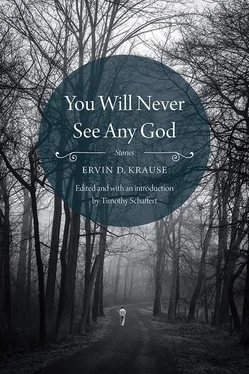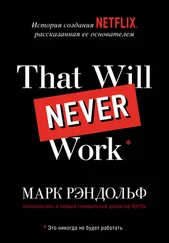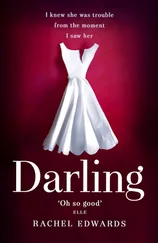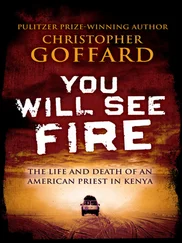Leonard said nothing. He studied the car, a Chevrolet about ten years old, with a ’71 Iowa license. That would be O’Brien County, he thought, remembering that trivia from his high school days. “You from up around Sheldon?” he asked.
The other’s face tightened a little. He was turning wary. “Sure am,” he said after a moment. “Sibley.”
“We used to play Sibley in football. In my time.”
“Still do, I guess. I never played football. Played baseball a little.”
“Maybe you know my younger brother. He’s about your age. Played baseball too.” Knowing somehow that the other had not played baseball either.
“Oh I never played much,” he said. “Might have seen him though.”
Leonard thought of it, the young man from Sibley, wiped out the family not ten miles away, hardly possible. Always the serious evil should come from farther away than Sibley, from Chicago or Memphis or some other such distant place; oh, he knew well enough of the petty offenses, chicken or hay thieves who were either young punks or the old town derelicts, but he could scarcely accept the possibility that anyone who could commit serious and terrible offense could be someone truly close, a neighbor almost, a person from his own state, so near they were almost known to each other. Somberly he remembered that the penitentiary at Fort Madson was filled with good young men of his native state.
The young man fidgeted, squatting there on his haunches. “Yeh, I sure enjoyed that snooze. Tell your brother thanks.” He found a pack of cigarettes, took out a bent one. “I’ll get out of here soon’s I finish a cigarette. Wake me up you know.” He looked at Leonard. “Care for one?” he asked, rising and coming to the side of the creek. The young man moved easily, nothing strange, nothing warped about him. “Pretty steep bank along here.”
The young man put a stone in the cigarette pack and threw it across, the pack landing near Leonard’s feet. He went to it carefully, keeping his eye on the other, not turning his back on him. He got the pack and holding his rifle with pretended carelessness, the tip pointing about ten feet to the left of the young man’s head, he lit the one cigarette.
“Last one, huh?”
“Oh there’s more in the car,” the young man said, starting that way.
“No, don’t go,” Leonard said with sudden sharpness, his hand automatically fastening hard on the stock of the rifle.
The other looked at him, turning back calmly. It was then that Leonard saw the blotches on the other’s pant leg, dark, almost the color of an oil stain or old blood. The other saw him looking, noticed it too, and when he sat down he kept the leg behind him. “You just give the word if you want another cigarette,” he said.
“Sure,” Leonard said.
“Got a bandage, I see,” the other said, pointing at his own neck to where the bandage was on Leonard’s.
“A little operation I had just a little while ago,” Leonard said.
“What for? You know, I had an operation once, but that was some years ago, when I was a kid. Mastoid operation. Oh, that was tough. The nurse went away, and I pulled everything out. Could have died, I guess. What’s yours for?”
“A biopsy to see if I have cancer.”
“Cancer.” Ah, what a word, Leonard thought, almost smiling, a word that carries its own exclamation point after it. “How’d it turn out?”
“I have cancer.”
“Son of a bitch,” the young man said with a kind of understanding and sympathy that Leonard would not have believed possible.
“Now I do a little shooting to take my mind off it,” he said, knowing that his mind had not been taken off it since he found out.
“If all your shots are like that last one, you’re some hell of a shot.”
“Do you do any shooting?”
The blue eyes came up, studied him a moment. “Me? No. Oh, I’ve hunted now and then.”
“What do you hunt?” Yes, what do you give palliation to, was it palliation the five in the farmhouse wanted yesterday afternoon?
“You know, rabbits, pheasant. The best ones are out of season, ain’t they?”
Somehow shaping them together, Leonard thought, he knowing that anything he shot here in May was out of season, from pigeons to rabbits to song birds. Just as people were out of season.
“You ever been to Craig?”
There was a careful hesitation. “Craig? Is that a town? No, I don’t believe I’ve been there. No.”
“Some people were murdered there yesterday. Farmhouse right near Craig.”
“Is that right?”
“Nobody can figure out why the young hired man was shot too.” Leonard waited. The other pulled at grass stems, acted as if he had not heard. “He was a young fellow about your age. Shot with the family; weren’t even relatives.”
The blue eyes looked at him. “I hadn’t heard about it. I wasn’t listening to the news. I bet it makes quite a story around these parts.”
“Yes, it’s quite a story all right,” Leonard said.
A story of choosing, he thought, the kind of choosing that had troubled him in these last few weeks. He had been chosen like the five in the house by Craig, like he had chosen the squirrel or the cat to shoot. God had nothing to do with it really, he thought — there was no evidence of such involvement one way or the other — but yet it remained that something somewhere, inside him or out, had chosen him. By strange accident perhaps. His being somewhere or not being somewhere, perhaps — as that young hired man’s bad luck to be at the house where the murderer struck — had made the difference. He was not aware of any commission of awful sin to warrant his death at thirty-six, or whenever. No, it was best to leave God out of it, until we knew ourselves better, and that would take a thousand years at least.
An icy chill at his abdomen, snuff and crawl of cancerous lumps, like cool rats in his belly.
“I wonder,” he said, clearing his throat, “if the motive was robbery.” The other said nothing, picked at the grass by handfuls.
But what could I be robbed of? Leonard asked himself. Could anything really be so anxious to get his flesh?
“Or maybe it was a whim.”
“A what?” the other said.
“You know, just a hell of it, spur of the moment thing. Just to kill something. The way you shoot things sometimes, like birds.”
“Yeh. Like birds you can’t even eat,” in a petulant tone. Vaguely accusatory, alluding to his shot of the wren, Leonard knew. He could have laughed at that.
“Or maybe an old hatred. An old score to be settled.”
The other grunted something, dug at the grass and weeds with his slender hands.
What offense had he given to his body at some distant time or place, what had he defiled, and it had lain in wait, remembering?
Something tiny, that is not wanted, doesn’t belong there, something driven apart, and then it returns, burrows into one cell, blasts it apart, enjoys it, it’s wonderful, tries another and another, loves the way they’re ripped and bloody, devours them, destroys them, expands them till they crack. Ah!
“Or perhaps just crazy…”
The other started at the words, turned rigid. Leonard from his side feeling the jolt here of meeting something lethal. The other’s hand still snatching at the dirt.
“… just madness. Somebody went crazy, came upon them, killed them…”
The other flung the handful of dirt and grass to the side. “Crazy?” he screamed at Leonard. “They don’t have to be crazy.”
Very calmly Leonard sat, watched the other. “Oh, what else then?” he said. “What else to account for it?” He cranked his neck against the bite beneath the bandage. And what else to account for the rampant surge of inflamed and maddened cells within him? What else?
Читать дальше











